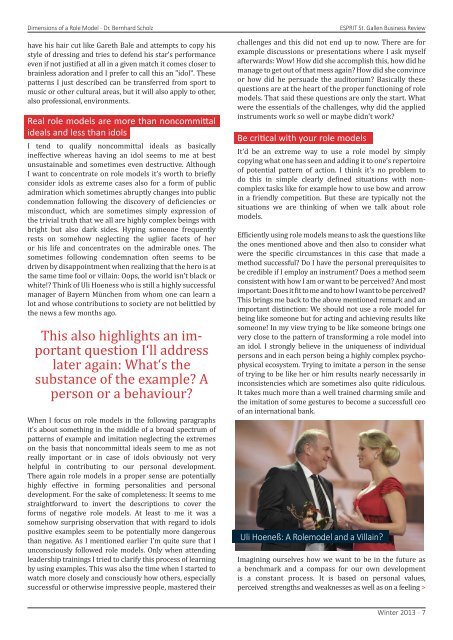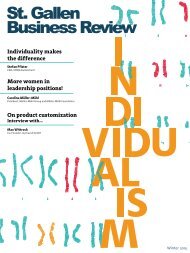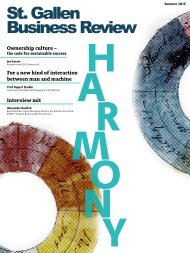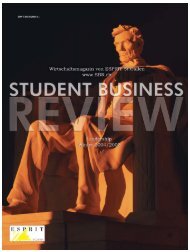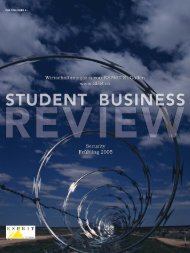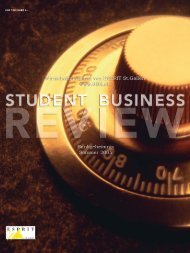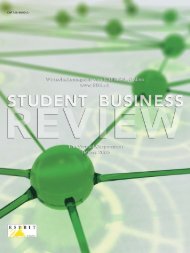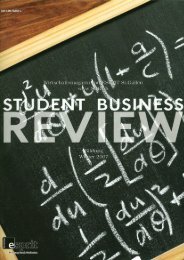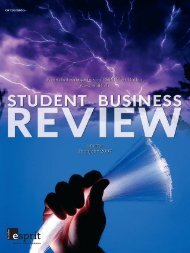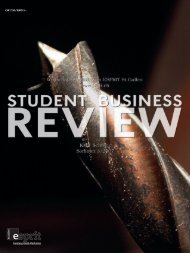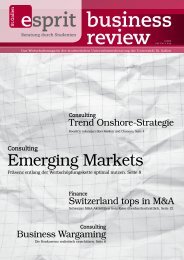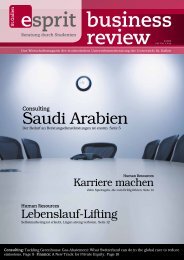Role Models & Responsibility
St. Gallen Business Review Winter 2013
St. Gallen Business Review
Winter 2013
You also want an ePaper? Increase the reach of your titles
YUMPU automatically turns print PDFs into web optimized ePapers that Google loves.
Dimensions of a <strong>Role</strong> Model - Dr. Bernhard Scholz<br />
have his hair cut like Gareth Bale and attempts to copy his<br />
<br />
<br />
brainless adoration and I prefer to call this an "idol". These<br />
patterns I just described can be transferred from sport to<br />
music or other cultural areas, but it will also apply to other,<br />
also professional, environments.<br />
<br />
ideals and less than idols<br />
I tend to qualify noncommittal ideals as basically<br />
ineffective whereas having an idol seems to me at best<br />
unsustainable and sometimes even destructive. Although<br />
<br />
consider idols as extreme cases also for a form of public<br />
admiration which sometimes abruptly changes into public<br />
<br />
misconduct, which are sometimes simply expression of<br />
the trivial truth that we all are highly complex beings with<br />
bright but also dark sides. Hyping someone frequently<br />
rests on somehow neglecting the uglier facets of her<br />
or his life and concentrates on the admirable ones. The<br />
sometimes following condemnation often seems to be<br />
driven by disappointment when realizing that the hero is at<br />
<br />
white!? Think of Uli Hoeness who is still a highly successful<br />
<br />
lot and whose contributions to society are not belittled by<br />
the news a few months ago.<br />
This also highlights an important<br />
question I‘ll address<br />
later again: What‘s the<br />
substance of the example? A<br />
person or a behaviour?<br />
When I focus on role models in the following paragraphs<br />
<br />
patterns of example and imitation neglecting the extremes<br />
on the basis that noncommittal ideals seem to me as not<br />
really important or in case of idols obviously not very<br />
helpful in contributing to our personal development.<br />
There again role models in a proper sense are potentially<br />
highly effective in forming personalities and personal<br />
<br />
straightforward to invert the descriptions to cover the<br />
forms of negative role models. At least to me it was a<br />
somehow surprising observation that with regard to idols<br />
positive examples seem to be potentially more dangerous<br />
<br />
unconsciously followed role models. Only when attending<br />
leadership trainings I tried to clarify this process of learning<br />
by using examples. This was also the time when I started to<br />
watch more closely and consciously how others, especially<br />
successful or otherwise impressive people, mastered their<br />
ESPRIT St. Gallen Business Review<br />
challenges and this did not end up to now. There are for<br />
example discussions or presentations where I ask myself<br />
afterwards: Wow! How did she accomplish this, how did he<br />
manage to get out of that mess again? How did she convince<br />
or how did he persuade the auditorium? Basically these<br />
questions are at the heart of the proper functioning of role<br />
models. That said these questions are only the start. What<br />
were the essentials of the challenges, why did the applied<br />
<br />
<br />
be an extreme way to use a role model by simply<br />
<br />
<br />
<br />
complex tasks like for example how to use bow and arrow<br />
in a friendly competition. But these are typically not the<br />
situations we are thinking of when we talk about role<br />
models.<br />
<br />
the ones mentioned above and then also to consider what<br />
<br />
method successful? Do I have the personal prerequisites to<br />
be credible if I employ an instrument? Does a method seem<br />
consistent with how I am or want to be perceived? And most<br />
<br />
This brings me back to the above mentioned remark and an<br />
important distinction: We should not use a role model for<br />
being like someone but for acting and achieving results like<br />
someone! In my view trying to be like someone brings one<br />
very close to the pattern of transforming a role model into<br />
an idol. I strongly believe in the uniqueness of individual<br />
persons and in each person being a highly complex psychophysical<br />
ecosystem. Trying to imitate a person in the sense<br />
of trying to be like her or him results nearly necessarily in<br />
inconsistencies which are sometimes also quite ridiculous.<br />
It takes much more than a well trained charming smile and<br />
the imitation of some gestures to become a successfull ceo<br />
of an international bank.<br />
Uli Hoeneß: A <strong>Role</strong>model and a Villain?<br />
Imagining ourselves how we want to be in the future as<br />
a benchmark and a compass for our own development<br />
is a constant process. It is based on personal values,<br />
perceived strengths and weaknesses as well as on a feeling ><br />
Winter 2013 - 7


